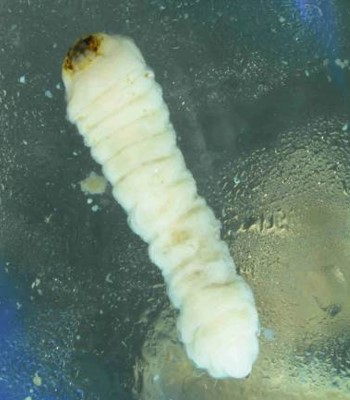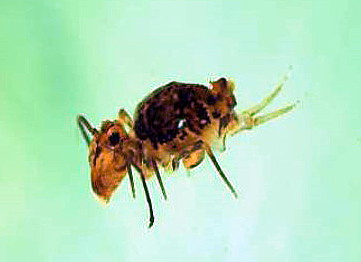CHARLESTON, S.C. – U.S. Customs and Border Protection (CBP), Office of Field Operations, at Charleston seaport announced the interceptions of a species of long-horned beetles and a species of “globular springtail” insects from a recent shipment into the port. The freight arrived in late April from Italy and the insects, in various stages of growth including larvae and adults, were discovered nestled into wood pallets and plastic wrap in a shipment of wine destined for a South Carolina based distributor.

this round-headed bore pest
If these non-native insects were to enter the South Carolina environment and establish themselves, they could do grave damage to hardwood trees and native plants, fungi, and algae.
“When the public thinks of CBP, preventing terrorism and the unlawful entry of people and things usually comes to mind,” said Charleston Acting Area Port Director Joanne Fogg. “Our agriculture mission addresses a special type of illegal entry – the kind initiated by invasive pests that can do billions of dollars of damage to our environment, agriculture, and economy.”
The long-horned beetle larvae, which belong to the Cerambycidae family, are commonly called “round-headed bores.” When introduced to a new environment, they can cause extensive damage to living trees and untreated lumber or wood used in buildings and other structures. This species’ close relative, the Asian Long-Horned Beetle, has already infested areas in Massachusetts, New York, and Ohio at great financial and resource expense to those areas.
South Carolina is at particular risk for hardwood tree-damaging insects – a 2017 South Carolina Forestry Commission report indicated that forestry is among the state’s most significant industries with $21 billion in annual economic output.

this globular springtail pest
The globular springtails, from the Sminthuridae family, consume native plants, fungi and algae, causing plant damage and stripping environments of food sources usually reserved for native species.
The discovery was made during the course of a multi-agency operation focused on a different pest risk – snails. While no snails were discovered in any of the many shipments examined, these non-native pests and various less significant violations were discovered instead. CBP worked with the U.S. Department of Agriculture (USDA), Clemson University Department of Plant Industry and North Carolina Department of Agriculture on the operation.
CBP’s Office of Field Operations is the primary organization within Homeland Security tasked with an anti-terrorism mission at our nation’s ports. CBP officers screen all people, vehicles and goods entering the U.S. while facilitating the flow of legitimate trade and travel. CBP conducts inspection operations and intercepts currency, weapons, prohibited agriculture products and other illicit items at U.S. ports of entry nationwide. View CBP Snapshot to learn some of what CBP achieves “On a Typical Day.”

